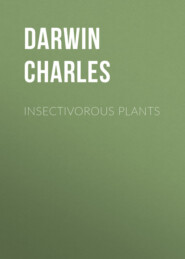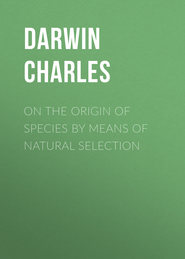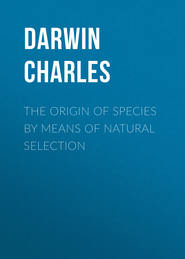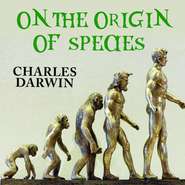По всем вопросам обращайтесь на: info@litportal.ru
(©) 2003-2024.
✖
More Letters of Charles Darwin — Volume 1
Настройки чтения
Размер шрифта
Высота строк
Поля
I am extremely much obliged to you for having so fully entered on my point. I knew I was on unsafe ground, but it proves far unsafer than I had thought. I had thought that Brulle (52/1. This no doubt refers to A. Brulle's paper in the "Comptes rendus" 1844, of which a translation is given in the "Annals and Mag. of Natural History," 1844, page 484. In speaking of the development of the Articulata, the author says "that the appendages are manifested at an earlier period of the existence of an Articulate animal the more complex its degree of organisation, and vice versa that they make their appearance the later, the fewer the number of transformations which it has to undergo.") had a wider basis for his generalisation, for I made the extract several years ago, and I presume (I state it as some excuse for myself) that I doubted it, for, differently from my general habit, I have not extracted his grounds. It was meeting with Barneoud's paper which made me think there might be truth in the doctrine. (52/2. Apparently Barneoud "On the Organogeny of Irregular Corollas," from the "Comptes rendus," 1847, as given in "Annals and Mag. of Natural History," 1847, page 440. The paper chiefly deals with the fact that in their earliest condition irregular flowers are regular. The view attributed to Barneoud does not seem so definitely given in this paper as in a previous one ("Ann. Sc. Nat." Bot., Tom. VI., page 268.) Your instance of heart and brain of fish seems to me very good. It was a very stupid blunder on my part not thinking of the posterior part of the time of development. I shall, of course, not allude to this subject, which I rather grieve about, as I wished it to be true; but, alas! a scientific man ought to have no wishes, no affections — a mere heart of stone.
There is only one point in your letter which at present I cannot quite follow you in: supposing that Barneoud's (I do not say Brulle's) remarks were true and universal — i.e., that the petals which have to undergo the greatest amount of development and modification begin to change the soonest from the simple and common embryonic form of the petal — if this were a true law, then I cannot but think that it would throw light on Milne Edwards' proposition that the wider apart the classes of animals are, the sooner do they diverge from the common embryonic plan — which common embryonic {plan} may be compared with the similar petals in the early bud, the several petals in one flower being compared to the distinct but similar embryos of the different classes. I much wish that you would so far keep this in mind, that whenever we meet I might hear how far you differ or concur in this. I have always looked at Barneoud's and Brulle's proposition as only in some degree analogous.
P.S. I see in my abstract of Milne Edwards' paper, he speaks of "the most perfect and important organs" as being first developed, and I should have thought that this was usually synonymous with the most developed or modified.
LETTER 53. TO J.D. HOOKER.
(53/1. The following letter is chiefly of interest as showing the amount and kind of work required for Darwin's conclusions on "large genera varying," which occupy no more than two or three pages in the "Origin" (Edition I., page 55). Some correspondence on the subject is given in the "Life and Letters," II., pages 102-5.)
Down, August 22nd {1857}.
Your handwriting always rejoices the cockles of my heart; though you have no reason to be "overwhelmed with shame," as I did not expect to hear.
I write now chiefly to know whether you can tell me how to write to Hermann Schlagenheit (is this spelt right?) (53/2. Schlagintweit.), for I believe he is returned to England, and he has poultry skins for me from W. Elliot of Madras.
I am very glad to hear that you have been tabulating some Floras about varieties. Will you just tell me roughly the result? Do you not find it takes much time? I am employing a laboriously careful schoolmaster, who does the tabulating and dividing into two great cohorts, more carefully than I can. This being so, I should be very glad some time to have Koch, Webb's Canaries, and Ledebour, and Grisebach, but I do not know even where Rumelia is. I shall work the British flora with three separate Floras; and I intend dividing the varieties into two classes, as Asa Gray and Henslow give the materials, and, further, A. Gray and H.C. Watson have marked for me the forms, which they consider real species, but yet are very close to others; and it will be curious to compare results. If it will all hold good it is very important for me; for it explains, as I think, all classification, i.e. the quasi-branching and sub-branching of forms, as if from one root, big genera increasing and splitting up, etc., as you will perceive. But then comes in, also, what I call a principle of divergence, which I think I can explain, but which is too long, and perhaps you would not care to hear. As you have been on this subject, you might like to hear what very little is complete (for my schoolmaster has had three weeks' holidays) — only three cases as yet, I see.
BABINGTON — British Flora.
(*53/3. This sentence may be interpreted as follows: The number of species which present varieties are 134 per thousand in genera of 5 species and upwards. The result is obtained from tabulation of 593 species.)
HOOKER — New Zealand.
GODRON — Central France.
I do not enter into details on omitting introduced plants and very varying genera, as Rubus, Salix, Rosa, etc., which would make the result more in favour.
I enjoyed seeing Henslow extremely, though I was a good way from well at the time. Farewell, my dear Hooker: do not forget your visit here some time.
LETTER 54. TO J.D. HOOKER. Down, November 14th {1857}.
On Tuesday I will send off from London, whither I go on that day, Ledebour's three remaining volumes, Grisebach and Cybele, i.e., all that I have, and most truly am I obliged to you for them. I find the rule, as yet, of the species varying most in the large genera universal, except in Miquel's very brief and therefore imperfect list of the Holland flora, which makes me very anxious to tabulate a fuller flora of Holland. I shall remain in London till Friday morning, and if quite convenient to send me two volumes of D.C. Prodromus, I could take them home and tabulate them. I should think a volume with a large best known natural family, and a volume with several small broken families would be best, always supposing that the varieties are conspicuously marked in both. Have you the volume published by Lowe on Madeira? If so and if any varieties are marked I should much like to see it, to see if I can make out anything about habitats of vars. in so small an area — a point on which I have become very curious. I fear there is no chance of your possessing Forbes and Hancock "British Shells," a grand work, which I much wish to tabulate.
Very many thanks for seed of Adlumia cirrhosa, which I will carefully observe. My notice in the G. Ch. on Kidney Beans (54.1 "On the Agency of Bees in the Fertilisation of Papilionaceous Flowers" ("Gardeners' Chronicle," 1857, page 725).) has brought me a curious letter from an intelligent gardener, with a most remarkable lot of beans, crossed in a marvellous manner IN THE FIRST GENERATION, like the peas sent to you by Berkeley and like those experimentalised on by Gartner and by Wiegmann. It is a very odd case; I shall sow these seeds and see what comes up. How very odd that pollen of one form should affect the outer coats and size of the bean produced by pure species!..
LETTER 55. TO J.D. HOOKER. Down {1857?}.
You know how I work subjects: namely, if I stumble on any general remark, and if I find it confirmed in any other very distinct class, then I try to find out whether it is true, — if it has any bearing on my work. The following, perhaps, may be important to me. Dr. Wight remarks that Cucurbitaceae (55/1. Wight, "Remarks on the Fruit of the Natural Order Cucurbitaceae" ("Ann. Mag. Nat. Hist." VIII., page 261). R. Wight, F.R.S. (1796-1872) was Superintendent of the Madras Botanic Garden.) is a very isolated family, and has very diverging affinities. I find, strongly put and illustrated, the very same remark in the genera of hymenoptera. Now, it is not to me at first apparent why a very distinct and isolated group should be apt to have more divergent affinities than a less isolated group. I am aware that most genera have more affinities than in two ways, which latter, perhaps, is the commonest case. I see how infinitely vague all this is; but I should very much like to know what you and Mr. Bentham (if he will read this), who have attended so much to the principles of classification, think of this. Perhaps the best way would be to think of half a dozen most isolated groups of plants, and then consider whether the affinities point in an unusual number of directions. Very likely you may think the whole question too vague to be worth consideration.
LETTER 56. TO J.D. HOOKER. Down, April 8th {1857}.
I now want to ask your opinion, and for facts on a point; and as I shall often want to do this during the next year or two, so let me say, once for all, that you must not take trouble out of mere good nature (of which towards me you have a most abundant stock), but you must consider, in regard to the trouble any question may take, whether you think it worth while — as all loss of time so far lessens your original work — to give me facts to be quoted on your authority in my work. Do not think I shall be disappointed if you cannot spare time; for already I have profited enormously from your judgment and knowledge. I earnestly beg you to act as I suggest, and not take trouble solely out of good-nature.
My point is as follows: Harvey gives the case of Fucus varying remarkably, and yet in same way under most different conditions. D. Don makes same remark in regard to Juncus bufonius in England and India. Polygala vulgaris has white, red, and blue flowers in Faroe, England, and I think Herbert says in Zante. Now such cases seem to me very striking, as showing how little relation some variations have to climatal conditions.
Do you think there are many such cases? Does Oxalis corniculata present exactly the same varieties under very different climates?
How is it with any other British plants in New Zealand, or at the foot of the Himalaya? Will you think over this and let me hear the result?
One other question: do you remember whether the introduced Sonchus in New Zealand was less, equally, or more common than the aboriginal stock of the same species, where both occurred together? I forget whether there is any other case parallel with this curious one of the Sonchus...
I have been making good, though slow, progress with my book, for facts have been falling nicely into groups, enlightening each other.
LETTER 57. TO T.H. HUXLEY. Moor Park, Farnham, Surrey {1857?}.
Your letter has been forwarded to me here, where I am profiting by a few weeks' rest and hydropathy. Your letter has interested and amused me much. I am extremely glad you have taken up the Aphis (57/1. Professor Huxley's paper on the organic reproduction of Aphis is in the "Trans. Linn. Soc." XXII. (1858), page 193. Prof. Owen had treated the subject in his introductory Hunterian lecture "On Parthenogenesis" (1849). His theory cannot be fully given here. Briefly, he holds that parthenogenesis is due to the inheritance of a "remnant of spermatic virtue": when the "spermatic force" or "virtue" is exhausted fresh impregnation occurs. Huxley severely criticises both Owen's facts and his theory.) question, but, for Heaven's sake, do not come the mild Hindoo (whatever he may be) to Owen; your father confessor trembles for you. I fancy Owen thinks much of this doctrine of his; I never from the first believed it, and I cannot but think that the same power is concerned in producing aphides without fertilisation, and producing, for instance, nails on the amputated stump of a man's fingers, or the new tail of a lizard. By the way, I saw somewhere during the last week or so a statement of a man rearing from the same set of eggs winged and wingless aphides, which seemed new to me. Does not some Yankee say that the American viviparous aphides are winged? I am particularly glad that you are ruminating on the act of fertilisation: it has long seemed to me the most wonderful and curious of physiological problems. I have often and often speculated for amusement on the subject, but quite fruitlessly. Do you not think that the conjugation of the Diatomaceae will ultimately throw light on the subject? But the other day I came to the conclusion that some day we shall have cases of young being produced from spermatozoa or pollen without an ovule. Approaching the subject from the side which attracts me most, viz., inheritance, I have lately been inclined to speculate, very crudely and indistinctly, that propagation by true fertilisation will turn out to be a sort of mixture, and not true fusion, of two distinct individuals, or rather of innumerable individuals, as each parent has its parents and ancestors. I can understand on no other view the way in which crossed forms go back to so large an extent to ancestral forms. But all this, of course, is infinitely crude. I hope to be in London in the course of this month, and there are two or three points which, for my own sake, I want to discuss briefly with you.
LETTER 58. TO T.H. HUXLEY. Down, September 26th {1857}.
Thanks for your very pleasant note. It amuses me to see what a bug-bear I have made myself to you; when having written some very pungent and good sentence it must be very disagreeable to have my face rise up like an ugly ghost. (58/1. This probably refers to Darwin's wish to moderate a certain pugnacity in Huxley.) I have always suspected Agassiz of superficiality and wretched reasoning powers; but I think such men do immense good in their way. See how he stirred up all Europe about glaciers. By the way, Lyell has been at the glaciers, or rather their effects, and seems to have done good work in testing and judging what others have done...
In regard to classification and all the endless disputes about the "Natural System," which no two authors define in the same way, I believe it ought, in accordance to my heterodox notions, to be simply genealogical. But as we have no written pedigrees you will, perhaps, say this will not help much; but I think it ultimately will, whenever heterodoxy becomes orthodoxy, for it will clear away an immense amount of rubbish about the value of characters, and will make the difference between analogy and homology clear. The time will come, I believe, though I shall not live to see it, when we shall have very fairly true genealogical trees of each great kingdom of Nature.
LETTER 59. TO T.H. HUXLEY. Down, December 16th {1857}.
In my opinion your Catalogue (59/1. It appears from a letter to Sir J.D. Hooker (December 25th, 1857) that the reference is to the proofs of Huxley's "Explanatory Preface to the Catalogue of the Palaeontological Collection in the Museum of Practical Geology," by T.H. Huxley and R. Etheridge, 1865. Mr. Huxley appends a note at page xlix: "It should be noted that these pages were written before the appearance of Mr. Darwin's book on 'The Origin of Species' — a work which has effected a revolution in biological speculation.") is simply the very best resume, by far, on the whole science of Natural History, which I have ever seen. I really have no criticisms: I agree with every word. Your metaphors and explanations strike me as admirable. In many parts it is curious how what you have written agrees with what I have been writing, only with the melancholy difference for me that you put everything in twice as striking a manner as I do. I append, more for the sake of showing that I have attended to the whole than for any other object, a few most trivial criticisms.
I was amused to meet with some of the arguments, which you advanced in talk with me, on classification; and it pleases me, {that} my long proses were so far not thrown away, as they led you to bring out here some good sentences. But on classification (59/2. This probably refers to Mr. Huxley's discussion on "Natural Classification," a subject hardly susceptible of fruitful treatment except from an evolutionary standpoint.) I am not quite sure that I yet wholly go with you, though I agree with every word you have here said. The whole, I repeat, in my opinion is admirable and excellent.
LETTER 60. TO J.D. HOOKER. Down, February 28th {1858}.
Hearty thanks for De Candolle received. I have put the big genera in hand. Also many thanks for your valuable remarks on the affinities of the species in great genera, which will be of much use to me in my chapter on classification. Your opinion is what I had expected from what little I knew, but I much wanted it confirmed, and many of your remarks were more or less new to me and all of value.
You give a poor picture of the philosophy of Botany. From my ignorance, I suppose, I can hardly persuade myself that things are quite as bad as you make them, — you might have been writing remarks on Ornithology! I shall meditate much on your remarks, which will also come in very useful when I write and consider my tables of big and small genera. I grieve for myself to say that Watson agrees with your view, but with much doubt. I gave him no guide what your opinion was. I have written to A. Gray and to X., who — i.e. the latter — on this point may be looked at as S. Smith's Foolometer.
I am now working several of the large local Floras, with leaving out altogether all the smallest genera. When I have done this, and seen what the sections of the largest genera say, and seen what the results are of range and commonness of varying species, I must come to some definite conclusion whether or not entirely to give up the ghost. I shall then show how my theory points, how the facts stand, then state the nature of your grievous assault and yield entirely or defend the case as far as I can honestly.
Again I thank you for your invaluable assistance. I have not felt the blow {Hooker's criticisms} so much of late, as I have been beyond measure interested on the constructive instinct of the hive-bee. Adios, you terrible worrier of poor theorists!
LETTER 61. TO J.D. HOOKER. Down {1858?}
Many thanks for Ledebour and still more for your letter, with its admirable resume of all your objections. It is really most kind of you to take so very much trouble about what seems to you, and probably is, mere vagaries.
I will earnestly try and be cautious. I will write out my tables and conclusion, and (when well copied out) I hope you will be so kind as to read it. I will then put it by and after some months look at it with fresh eyes. I will briefly work in all your objections and Watson's. I labour under a great difficulty from feeling sure that, with what very little systematic work I have done, small genera were more interesting and therefore more attracted my attention.
One of your remarks I do not see the bearing of under your point of view — namely, that in monotypic genera "the variation and variability" are "much more frequently noticed" than in polytypic genera. I hardly like to ask, but this is the only one of your arguments of which I do not see the bearing; and I certainly should be very glad to know. I believe I am the slowest (perhaps the worst) thinker in England; and I now consequently fully admit the full hostility of Urticaceae, which I will give in my tables.
I will make no remarks on your objections, as I do hope you will read my MS., which will not cost you much trouble when fairly copied out. From my own experience, I hardly believe that the most sagacious observers, without counting, could have predicted whether there were more or fewer recorded varieties in large or small genera; for I found, when actually making the list, that I could never strike a balance in my mind, — a good many varieties occurring together, in small or in large genera, always threw me off the balance...
P.S. — I have just thought that your remark about the much variation of monotypic genera was to show me that even in these, the smallest genera, there was much variability. If this be so, then do not answer; and I will so understand it.
LETTER 62. TO J.D. HOOKER. February 23rd {1858}.
Will you think of some of the largest genera with which you are well acquainted, and then suppose 4/5 of the species utterly destroyed and unknown in the sections (as it were) as much as possible in the centre of such great genera. Then would the remaining 1/5 of the species, forming a few sections, be, according to the general practice of average good Botanists, ranked as distinct genera? Of course they would in that case be closely related genera. The question, in fact, is, are all the species in a gigantic genus kept together in that genus, because they are really so very closely similar as to be inseparable? or is it because no chasms or boundaries can be drawn separating the many species? The question might have been put for Orders.
LETTER 63. TO J.D. HOOKER. Down, February 9th {1858}.
I should be very much obliged for your opinion on the enclosed. You may remember in the three first volumes tabulated, all orders went right except Labiatae. By the way, if by any extraordinary chance you have not thrown away the scrap of paper with former results, I wish you would return it, for I have lost my copy, and I shall have all the division to do again; but DO NOT hunt for it, for in any case I should have gone over the calculation again.
















